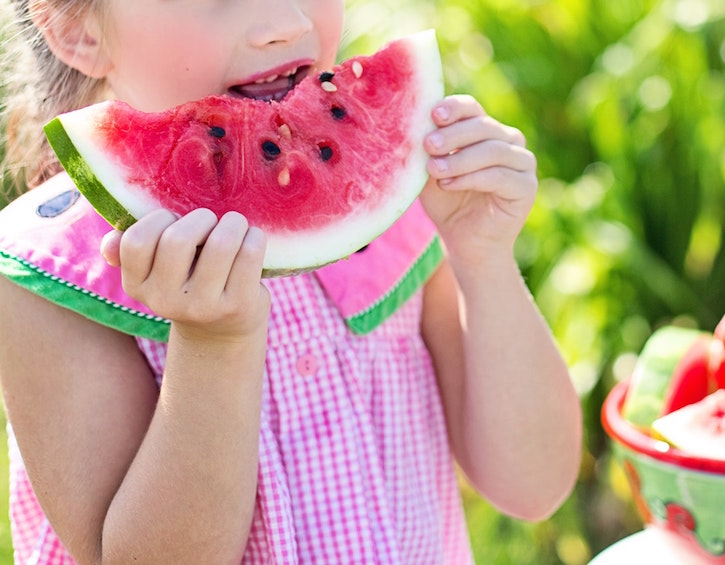
 Post Category - ParentingParenting - Post Category - Toddler & PreschoolerToddler & Preschooler
Post Category - ParentingParenting - Post Category - Toddler & PreschoolerToddler & Preschooler Post Category - Wellness & BeautyWellness & Beauty - Post Category - HealthHealth
Post Category - Wellness & BeautyWellness & Beauty - Post Category - HealthHealthIf your little one won’t try anything new, if they are surviving on jam sandwiches (no crusts and cut into triangles thank you!) and if meal times have become a battle zone, then listen up!
We spoke to Eve Persak, Nutrition Advisor for SuperNature for her 10 hottest tips on how to prevent and overcome picky eating in kids. The good news is that with some effort and persistence, there is still hope that you’ll soon have little foodies munching down on the same colourful diverse healthy food that the whole family enjoys.
1. Good Eating Habits Start Early: Breastfeeding
If you’re pregnant or breastfeeding, now’s the time to start thinking about how to encourage good healthy eaters! The maternal diet is a major influencer in feeding development overall. When you breastfeed, the flavour profile of your breast milk fluctuates with your diet. The foods you eat are indirectly introduced (in trace amounts) to your newborn through breast milk. Eating a varied and healthy diet now exposes your baby to variety unbeknownst to them before they even hit solids.
2. Allow for Hunger
When introducing foods, it helps to keep natural appetite cues on your side. That means no snacking (say 1 to 2 hours) before meal times – letting your kid wait a small amount of time before their meal will ensure they are hungry enough to eat. Offer new items first to allow natural hunger drives to make the new offering more attractive. You can always top up your kids feed with milk after they have had a good meal – conversely, if you offer milk first, they simply won’t be hungry enough to tackle novel foods.


3. Keep Trying
Most parents express that they’ve tried certain items and after receiving a handful of vetos they give up. Don’t give in mama! Studies suggest that it takes in the range of 10-15 exposures for a new food to become familiar and therefore more acceptable.
4. Keep Calm
If mealtimes become a throw-down suffer fest for both parent and child, the entire environment sours and becomes less palatable (literally). Your kid will associate the room, the parent, the food, and the experience of eating negatively – which bodes poorly for feeding development overall. Keep things light – smile (that is, hide your frustration as best you can). If need be, lose the battle to win the war. You can always try again next time.
5. Don’t Punish
Certain centers of our brains actually work on a fundamental punishment-reward system and these centers are developing for infants and young children as they experience their world and their surroundings. As such, punishment – on a core level – hits an evolutionary ‘tender spot’ in a young one’s mind. When they are punished during a mealtime or an eating opportunity, this context becomes a fear-based memory or a painful imprint in their psyche – which then impacts all future experiences therein.


6. Don’t Reward (with Food)
On the flipside, rewarding can backfire as well. Young ones are essentially in training. When they receive a reward for a behavior, overtime they believe it to be a natural progression and always expect the same. So every meal warrants a prize. When foods are used as the reward – i.e. eat the apple and you’ll receive the cookie – the apple becomes the “work” food and the cookie becomes the “treat.”
7. Remove Distractions
Turn off the television. Leave the toys in the play area. While they may seem like ‘supports’ these communicate that mealtime is about activities other than eating. Without these tacit boundaries, mealtimes are more likely to become prolonged and a child disconnects from hunger and fullness cues. Likewise, distracted eating in childhood can translate to distracted eating in adulthood, which is often associated with poor appetite and weight control problems.
8. Be a Super Model
Yes, that’s right. Modeling. This is your shot, mama. When your little one sees you eat the same food as them and when mealtimes are a communal experience, your kiddo will understand this to be the familial, cultural and social “norm.” Early on, children are guided by these cues for how to engage, interact, and behave.
9. Wait it Out
Picky eating under most circumstances is actually a developmental rite of passage for infants, toddlers, and young children. It usually crops up initially when solids are introduced within the first year. It tends to hit its zenith around age two when likes and dislikes are developing and children find the means to communicate them. From there and until age 6, fussiness usually tends to decline progressively. Over this period, your little one is changing at lightning speed in all areas – and his or her palate is changing, too – becoming more liberal and less sensitive to flavours, textures, etc. This too shall pass, just keep offering and reoffering new and interesting foods.
10. Reach Out for Help
That being said, there are a few warning signs that your child’s troubled eating behaviors have crossed over from characteristic to concerning. As a parent it’s your responsibility to raise the red flag, blow the whistle and call in for back-up. If every meal is extremely prolonged (more than 60-75 minutes) or if there is a severe reaction when introducing new flavours or textures – not merely pushing food away with a hand or a tongue, but shaking, screaming, coughing, gagging, spitting up.
Do seek support:
– from a feeding clinic that might have a speech/occupational therapist who can screen for delayed oromotor skills. A doctor can test for underlying medical conditions too like relux or delayed gastric emptying if your child’s list of ‘accepted foods’ is severely limited or your child starts to look “lean” or you notice a slowing or lack of weight gain.
– a registered dietitian with experience in pediatrics and feeding disorders can screen for growth failure, assess intake of energy and nutrients for adequacy, and offer strategies for expanding your child’s food repertoire and supplementation, if and as needed.






